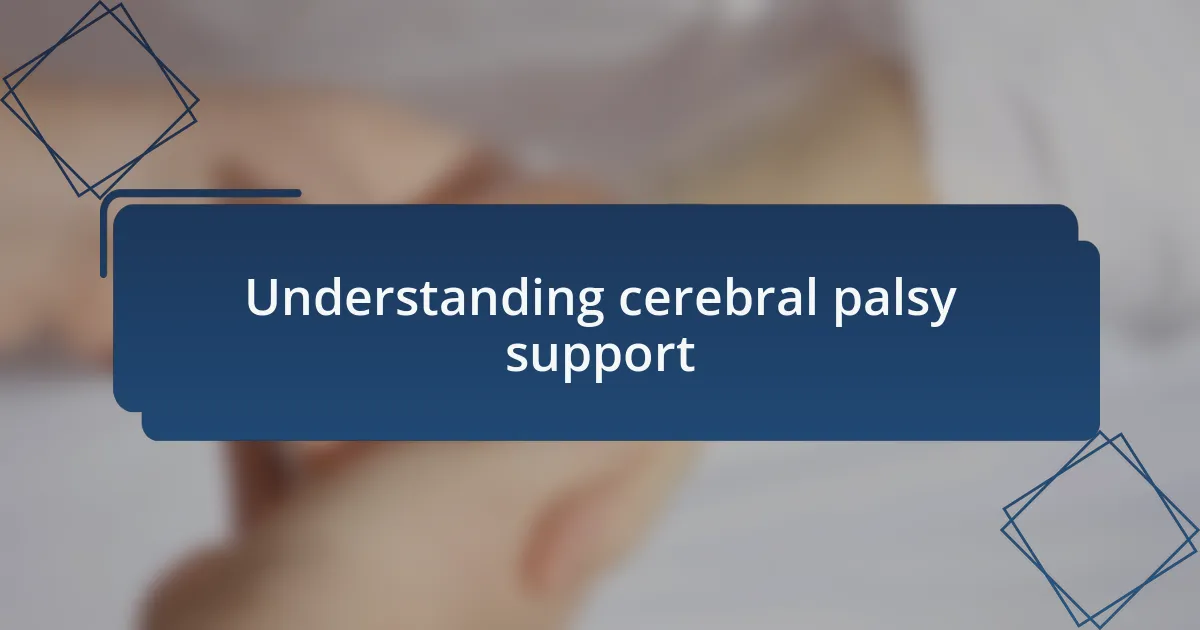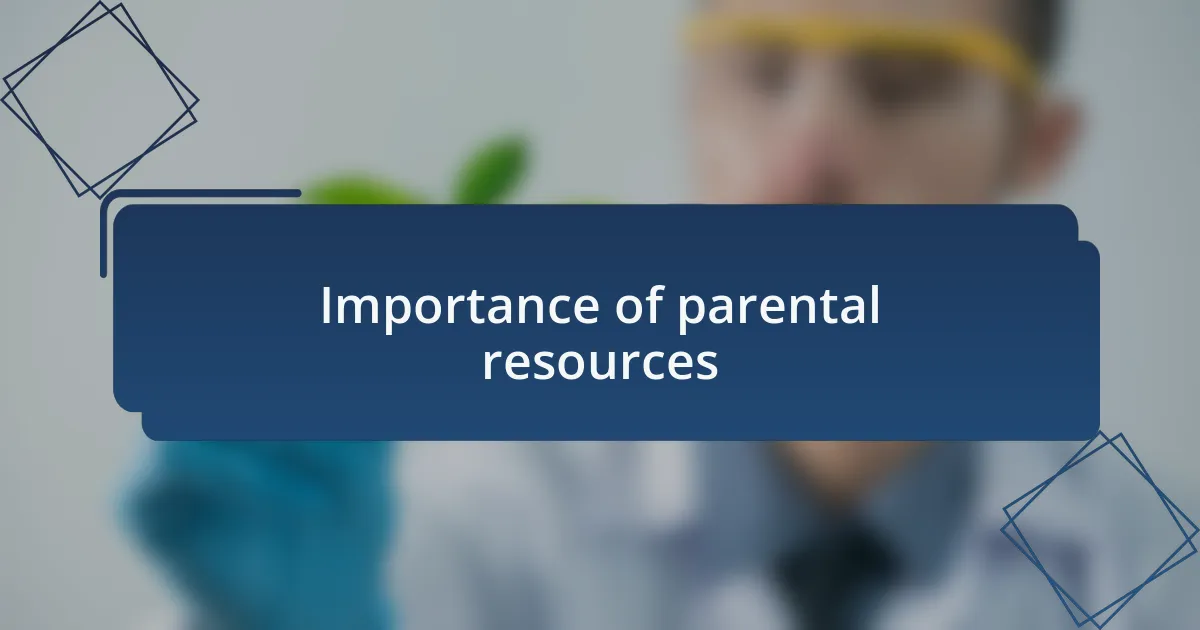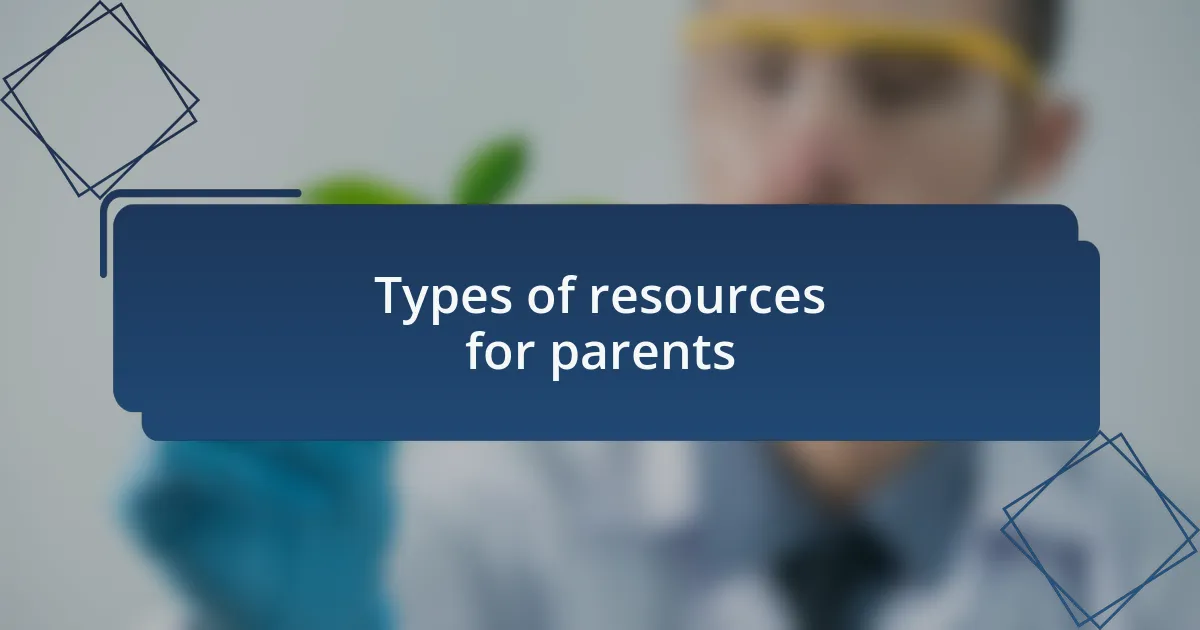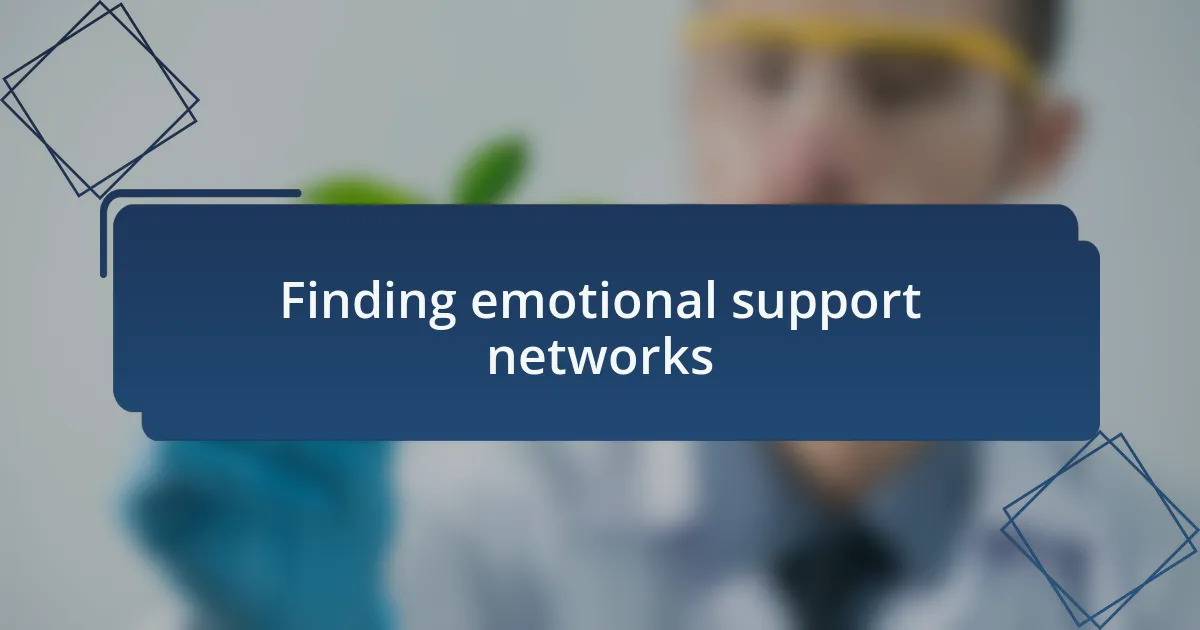Key takeaways:
- Supporting families affected by cerebral palsy requires tailored resources and access to information, community connections, and practical support like therapy and financial assistance.
- Emotional support networks, including support groups and shared experiences, empower parents and alleviate feelings of isolation.
- Effective advocacy for children with cerebral palsy involves understanding their needs, building community alliances, and celebrating small victories to maintain motivation and progress.

Understanding cerebral palsy support
Understanding how to support families affected by cerebral palsy is crucial. When I first encountered this journey with a friend, I realized that each individual requires tailored resources. What worked for one child did not necessarily fit another, leading me to appreciate the diversity of needs among families.
Navigating the vast array of support options can feel overwhelming. I recall a workshop where parents shared their struggles. It became clear that having access to reliable information and connecting with others in similar situations made a world of difference. It really brings to light the power of community and shared experiences.
Additionally, practical resources, like therapy programs and financial assistance, are vital for families. I often wonder: how can we ensure these resources are accessible to all? In my experience, funding for specialized therapies can fluctuate, so constant advocacy is essential to keep these services available. Understanding these intricacies has opened my eyes to the ongoing support families truly need.

Importance of parental resources
Access to parental resources is foundational for families navigating cerebral palsy. I remember a heart-to-heart conversation with a mother who was struggling to find appropriate therapies for her son. She expressed feeling lost amidst endless options, emphasizing that having the right resources could not only empower her but also transform her child’s progress.
The emotional weight of caring for a child with special needs often isolates parents, which is where resources become indispensable. I once facilitated a support group, and each session revealed how vital it was for parents to share their experiences and strategies. The shift in their outlook from despair to hope was palpable; it was like a cloudy sky giving way to sunlight, illuminating possibilities previously unseen.
It’s striking how different resources can directly affect a family’s quality of life. Reflecting on my own observations, I find myself asking: what if every parent had immediate access to comprehensive support? The reality is that when families are equipped with the right tools, they can advocate more effectively for their children’s needs, ultimately fostering a healthier environment for everyone involved.

Types of resources for parents
Accessible support groups are among the most invaluable resources for parents. I recall attending a local meeting where a mother spoke passionately about her journey. She candidly shared how connecting with others who understood her challenges not only validated her feelings but also provided her with practical strategies to address daily obstacles. I’ve seen firsthand how these groups can foster a sense of community that helps parents feel less isolated.
Another essential type of resource is educational materials tailored to cerebral palsy. I once discovered an excellent book that outlined various therapies and potential outcomes. It opened my eyes to new approaches and helped me advocate more effectively for children in my care. Without such resources, I often wonder how many families might miss out on vital information that could enhance their child’s development.
Finally, online forums and digital resources play a crucial role in today’s parenting landscape. I remember logging onto a popular site and finding a treasure trove of articles, videos, and parent testimonials. The ability to connect with a global community, share stories, and execute research from home can be incredibly empowering. Don’t you think that having the world at your fingertips can truly change how we view parenting a child with special needs?

Finding emotional support networks
Emotional support networks can be transformative for parents navigating life with a child who has cerebral palsy. I remember the first time I reached out to an online support group. I was nervous but soon found solace in the shared experiences of others. Their stories resonated deeply with me, reminding me that I wasn’t alone in this journey. Have you ever felt the comfort of shared understanding? It’s truly uplifting.
In-person support meetings can also have a profound impact. I vividly recall a gathering where we shared not just challenges but also our triumphs. One father’s story of his child learning to walk with assistance was a beacon of hope. That collective joy reinforced my belief in the power of community, showing me that celebrating small victories together can be incredibly healing.
Engaging with emotional support networks isn’t just beneficial; it’s essential. I often encourage parents to take that first step, even if it feels daunting. The connections I formed pushed me to advocate better for my child and enriched my understanding of their needs. How could a simple conversation change your outlook on parenting? In my experience, it’s these interactions that foster resilience and empower growth.

Navigating healthcare services

Navigating healthcare services
Understanding the labyrinth of healthcare services can be overwhelming for parents navigating cerebral palsy care. I recall the first time I entered a medical office, armed with a list of questions but feeling utterly lost. Have you ever felt the pressure of needing answers but not knowing where to turn? That’s a common experience I’ve encountered alongside other parents, and it makes seeking help feel even more critical.
One of the most valuable lessons I learned was the importance of building relationships with healthcare professionals. I vividly remember a pediatrician who took the time to discuss my child’s therapies in detail, breaking down complex medical terms into something comprehensible. That conversation not only eased my anxiety but also empowered me to be a more effective advocate for my child. Reflection on that moment makes me realize how crucial it is to seek clarity and maintain open lines of communication.
I encourage parents to advocate for their child’s needs actively, as it can profoundly impact the care journey. Have you ever thought about the difference a small inquiry can make in your child’s treatment plan? I’ve seen firsthand how a simple question can lead to discovering better resources or therapies, ultimately making a significant difference in our children’s lives. Navigating healthcare services doesn’t just mean managing appointments; it’s about fostering partnerships that uplift our children and our families.

Sharing personal experiences
Sharing personal experiences is a powerful way to connect and learn together. I remember a day when I sat in a support group meeting, listening to another parent share their journey with cerebral palsy. Their raw honesty about the challenges and victories hit home for me. Have you ever found solace in knowing someone else truly understands your struggles? That shared experience not only brought comfort but also inspired me to embrace my own path more fully.
One evening, after a particularly tough therapy session, I found myself reflecting on resilience. My child’s small triumphs, like taking a few steps or uttering a new word, felt monumental in the grand scheme of things. Sharing those moments with friends and family was not just about celebrating achievements; it felt like building a bridge of understanding. I realized that recounting these experiences helped others appreciate the progress and see the heart behind the challenges.
Sometimes, it’s the unplanned moments that stir the strongest emotions. I had an unexpected encounter at a local park, where I met another parent who shared similar concerns about their child’s development. Our candid conversation about fears and hopes opened the door to a supportive friendship. Have you considered how a simple chat with another parent could reshape your outlook? I learned that sharing our stories, no matter how different, creates a community that fosters empathy and strength.

Tips for effective advocacy
Effective advocacy begins with understanding the needs of individuals with cerebral palsy and their families. I recall attending a town hall meeting where a mother passionately outlined her child’s struggle for proper educational resources. Her ability to articulate specific needs and challenges resonated with many in the room. Don’t you think that speaking up with clarity can create waves of change? It certainly left an impression on me and highlighted the importance of being informed and prepared.
Another crucial tip is to build alliances within your community. I sat down with a local advocacy group, where I found a wealth of knowledge and support. The diversity of voices in that room exemplified strength in unity. Have you thought about which organizations or individuals might amplify your cause? Collaborating with others not only enriches your advocacy efforts but also fosters a broader understanding of the challenges faced by families like ours.
Lastly, always remember to celebrate small victories. After months of lobbying for accessible playground equipment, I found myself standing in awe as my child played freely alongside peers. That moment reminded me why advocacy matters—it’s not just about policy changes, but about improving quality of life. Reflecting on these milestones, I ask myself: how do we keep the momentum going? By focusing on progress, one step at a time, we inspire others to continue the fight for change.